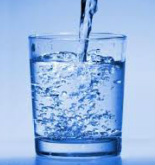The 6 Fundamentals for Optimal Health

There are some things in life you just can't live without; and when it comes to achieving and maintaining optimal health, that includes six fundamentals: water, sleep/rest, plant-based diet, exercise, fresh air, and sunshine. Each fundamental serves as a foundational pillar for building optimal health by allowing for the proper regulation of homeostasis (balance) and the efficient functioning of all systems within the human body. Stress, while a normal aspect of life, is constantly trying to disrupt our balance and efficiency, which can set the stage for disease development if not properly managed through adequate diet and lifestyle habits. If just one fundamental is neglected for long enough, poor health and disease/disorders can result. Be sure you're meeting your daily needs by checking out each fundamental below!

Water: 2-3 liters/day or 1 liter per 50 lbs of body weight
Water is the most abundant molecule found in the human body, accounting for roughly 65% of our body mass, and playing a vital role in every reaction within our cells. Water influences energy production, digestion, mood, metabolism, aging, and detoxification (toxin and fat removal).
Chronic dehydration is a normality these days due to the accessibility and preference for colas, coffee, alcohol, and energy drinks instead of water. Other dietary factors that contribute to a dehydrated system include high protein/fat diets, low calorie/carbohydrate diets, high sodium diets (over 2000 mg/day), nicotine, recreational drugs, weight loss pills, appetite suppressants, diuretics, laxatives, medication, and stimulants. Exercise, excessive sweating dry/cooked food, dry climates, hot temperatures, and all the factors that result in dehydration will increase daily water needs. The long term consequences of chronic dehydration include a slowed metabolism, migraines, chronic fatigue, thyroid dysfunction, acne, kidney/adrenal dysfunction, decreased immunity, brain fog, increased rate of aging, arthritis, heart disease, cancer, and weight gain.
Drinking enough water daily and consuming a diet high in carbohydrates (especially water-rich fruits and vegetables) and low in sodium aids proper hydration status within the cells. The best indicator of hydration status is urine color; very yellow or amber colored urine is a sign more fluid is needed in the body. Slightly yellow or clear urine indicates proper hydration. Exercise, excessive sweating dry/cooked food, dry climates, hot temperatures, and all the factors that result in dehydration will increase daily water needs.
Water is the most abundant molecule found in the human body, accounting for roughly 65% of our body mass, and playing a vital role in every reaction within our cells. Water influences energy production, digestion, mood, metabolism, aging, and detoxification (toxin and fat removal).
Chronic dehydration is a normality these days due to the accessibility and preference for colas, coffee, alcohol, and energy drinks instead of water. Other dietary factors that contribute to a dehydrated system include high protein/fat diets, low calorie/carbohydrate diets, high sodium diets (over 2000 mg/day), nicotine, recreational drugs, weight loss pills, appetite suppressants, diuretics, laxatives, medication, and stimulants. Exercise, excessive sweating dry/cooked food, dry climates, hot temperatures, and all the factors that result in dehydration will increase daily water needs. The long term consequences of chronic dehydration include a slowed metabolism, migraines, chronic fatigue, thyroid dysfunction, acne, kidney/adrenal dysfunction, decreased immunity, brain fog, increased rate of aging, arthritis, heart disease, cancer, and weight gain.
Drinking enough water daily and consuming a diet high in carbohydrates (especially water-rich fruits and vegetables) and low in sodium aids proper hydration status within the cells. The best indicator of hydration status is urine color; very yellow or amber colored urine is a sign more fluid is needed in the body. Slightly yellow or clear urine indicates proper hydration. Exercise, excessive sweating dry/cooked food, dry climates, hot temperatures, and all the factors that result in dehydration will increase daily water needs.

Sleep/Rest: 8-12 hours/night average
In our go-go society, inadequate rest is a factor that plagues millions, resulting in chronic fatigue, stress disorders, hormonal imbalances, anxiety/irritability, depression, slow metabolism, and low immune function. Getting enough sleep on a daily basis is essential for restoring, rejuvenating, rebooting, and repairing all systems of the body. Consistent early nights can enhance and regulate nerve and immune health, hormone production, digestion, nutrient uptake, toxin elimination, and muscle repair/recovery; all of which reduce stress and generate a faster, healthier metabolism.
In our go-go society, inadequate rest is a factor that plagues millions, resulting in chronic fatigue, stress disorders, hormonal imbalances, anxiety/irritability, depression, slow metabolism, and low immune function. Getting enough sleep on a daily basis is essential for restoring, rejuvenating, rebooting, and repairing all systems of the body. Consistent early nights can enhance and regulate nerve and immune health, hormone production, digestion, nutrient uptake, toxin elimination, and muscle repair/recovery; all of which reduce stress and generate a faster, healthier metabolism.

Exercise: 3+ hours of moderate intensity aerobic exercise/week
One of the major benefits of daily exercise is that it enhances oxygen and nutrient uptake into the cells, optimizing our metabolism, digestion, and overall body tone and fitness. Consistent exercise also acts as a pump for the lymphatic system (aka waste management), which is responsible for collecting and eliminating accumulated toxins, fat, and excess fluid from the body. Moderate intensity (light sweat inducing), aerobic exercise includes brisk walking, jogging, rebounding, hiking, recreational sports (basketball, soccer, football, tennis), cycling, swimming, rowing, boxing, etc. Consistent strength training (2-3x per week) can improve metabolism by increasing muscle mass, tone, and strength. Flexibility exercises, such as yoga or stretching, can enhance overall fitness by improving muscle recovery, tone, and length. To maximize fat loss, make 1-5% of your training high in intensity (sprinting, plyometrics, circuit training, hills, stairs) per week.
One of the major benefits of daily exercise is that it enhances oxygen and nutrient uptake into the cells, optimizing our metabolism, digestion, and overall body tone and fitness. Consistent exercise also acts as a pump for the lymphatic system (aka waste management), which is responsible for collecting and eliminating accumulated toxins, fat, and excess fluid from the body. Moderate intensity (light sweat inducing), aerobic exercise includes brisk walking, jogging, rebounding, hiking, recreational sports (basketball, soccer, football, tennis), cycling, swimming, rowing, boxing, etc. Consistent strength training (2-3x per week) can improve metabolism by increasing muscle mass, tone, and strength. Flexibility exercises, such as yoga or stretching, can enhance overall fitness by improving muscle recovery, tone, and length. To maximize fat loss, make 1-5% of your training high in intensity (sprinting, plyometrics, circuit training, hills, stairs) per week.

Plant-based Diet:
Calories: Women- 2000+/day; Men- 2500+/day
A calorie restrictive diet is a nutrient deficient one! In order to meet all of your daily nutrient requirements, adequate calories must be consumed on a consistent basis! Calories provide fuel and nutrients for the body, which enhance the metabolism and aid cellular repair and detoxification. Energy/calorie demands are increased with mental (stress) and physical (exercise) activity.
Carbohydrates: 70% or more of total daily calories
When carbohydrates are restricted/reduced in the diet, the metabolism suffers as the body is forced to perform the inefficient process of turning fat and protein into fuel. All cells within the human body run solely on glucose, with carbohydrates being the main supplier. Carbohydrates are essential for energy production, cell structure, healthy metabolism, muscle growth, adequate hydration, and efficient fat burning. Focus on consuming low fat, whole food, plant-based carbohydrate sources such as whole sweet fruits, starchy vegetables (potatoes, squash, corn), and whole grains (rice, quinoa, millet, barley, oats). Processed foods (cakes, cookies, pizza, donuts) are high in both carbohydrates and fat and should be minimized or avoided. Opt for high carb, low fat, plant-based alternatives to your favorite high fat processed foods (see Recipes). For optimum weight loss, aim for a daily average of 80-90% total calories from carbohydrates.
Protein: 15% or less of total daily calories
The recommended daily allowance (RDA) for protein is 46 grams/day for adult women and 56 grams/day for adult men. The average American consumes double the RDA for protein, increasing risk of chronic illness like heart disease, obesity, diabetes, kidney/liver disease, cancer, osteoporosis, arthritis, gout, digestive disorders, and more. All plant foods contain varying amounts of the 9 essential amino acids (protein) required for human health. Plant-based protein sources are high in fiber, essential nutrients, vitamins, minerals, antioxidants and low in saturated fat, cholesterol, and total fat compared to animal-based protein sources. Good sources of plant-based protein include beans/legumes (black beans, tofu, chickpeas, peas), nuts/seeds (hemp, sesame, almonds), grains (rice, quinoa, corn), leafy greens (spinach, kale, lettuce, broccoli), and fruits (berries, oranges, bananas). Aim to eliminate animal protein completely from the diet or reduce intake to 5% no more than 5%, opting for lean and clean (organic) products when chosen. Studies have indicated that consuming animal protein promotes cancer cell growth by stimulating IGF-1 hormone production. For optimum health and weight loss, aim for 5-10% of total calories from protein/day.
Fat: 15% or less of total daily calories
Only approximately 2% of total daily calories are required to fulfill essential fatty acid demands within the human body, which is enough to maintain health, hormone regulation, as well as provide the parts necessary for protection/insulation. All plant foods contain varying amounts of fatty acids, including the essential fatty acids omega-3 and omega-6. Opt for a diet rich in fruits and vegetables, which are high in the essential fatty acids but low in saturated fat, total fat, and contain no cholesterol. Plant-based sources of concentrated (overt) fat include avocado, coconut meat, durian, and nuts/seeds; unconcentrated plant-based fat sources include grains, beans/legumes, fruits, and vegetables. For weight loss and optimal health, aim to get the majority of your daily fat from unconcentrated plant-based fat sources vs. concentrated.
Avoid foods high in saturated fats, omega-6 fatty acids, cholesterol, and trans fat; all of which are found in processed food, refined oils, and animal products. Excess intake of dietary fat (particularly animal-based) can lead to weight gain, heart disease, cancer, diabetes, hormonal disorders, acne, and autoimmune diseases. Avoid or minimize (no more than 5% daily intake) animal fat consumption, including dairy products (cheese, butter, milk), eggs, and meat (beef, poultry, fish) as they are high in saturated fat and cholesterol, both of which dramatically increase risk of excess dietary fat related illnesses. Saturated fat intake should not exceed 10-15 grams/day. Easy ways to reduce the intake of dietary fat are to use water, nonstick pans, and parchment paper for cooking/baking/frying. For optimum health and weight loss, aim for 30 grams of total fat per day, or 5-10% of total calories from fat.
Fiber: 25+ grams/day
Adequate fiber intake promotes regular, consistent bowel movements, and aids the body in excreting waste, including excess fat (cholesterol) and toxins. All plant foods contain varying amounts of insoluble and soluble fiber, which keep the colon clean and lower the risk of cancer or heart disease. The SAD (standard American Diet) is devoid of fiber due to the heavy consumption of animal products and processed foods. Low fiber diets can result in chronic constipation, bowel disease, weight gain, cancer, heart disease and many other disorders. Read food labels on all packaged/processed foods to know the fiber content. Aim for an average of 2 bowel movements a day to ensure adequate fiber intake.
Sodium: 1500 mg/day or less
It is estimated that the average western diet contains a whooping 3000-5000 mg of sodium/day, mostly from processed foods and take out (restaurants). Only a small amount of dietary sodium is necessary to maintain cellular functioning and fluid balance. Excess dietary sodium (salt) can lead to water retention, weight gain, high blood pressure, dehydration, electrolyte imbalance, and increases risk of stroke and renal disease. Avoid adding salt to food (use lemon juice instead) and read all packaged food labels for sodium content. Opt for no salt added canned goods, and rinse canned beans packaged with salt. All plant foods contain small amounts of bio-available sodium that is enough to meet dietary needs. To reduce fluid retention that can sometimes take on the appearance of body fat, opt for 500 mg/day of sodium.
Vitamin B12: 1000 mcg/wk
Vitamin B12 is an essential nutrient involved in several metabolic processes, including energy production, DNA methylation, proper nutrient utilization, and detoxification. It is the only nutrient that cannot be obtained from food, thanks to our unnatural, toxic environment and impaired intestinal absorption. Luckily a healthy human body is able to store up to 2500 mcg of B12 and daily turnover rate is slow. Vitamin B12 status can be improved via supplementation, either injections or sublingual tablets. Methylcobalamin is the most preferred form of vitamin B12, as it has the highest absorption and ultilization rate compared to cyano- or hydroxo-cobalamin. Vitamin B12 deficiency can increase risk of heart disease, anemia, cancer, depression, Alziemer's disease, and osteoporosis. Visit the Shop for a vitamin B12 product link!
Calories: Women- 2000+/day; Men- 2500+/day
A calorie restrictive diet is a nutrient deficient one! In order to meet all of your daily nutrient requirements, adequate calories must be consumed on a consistent basis! Calories provide fuel and nutrients for the body, which enhance the metabolism and aid cellular repair and detoxification. Energy/calorie demands are increased with mental (stress) and physical (exercise) activity.
Carbohydrates: 70% or more of total daily calories
When carbohydrates are restricted/reduced in the diet, the metabolism suffers as the body is forced to perform the inefficient process of turning fat and protein into fuel. All cells within the human body run solely on glucose, with carbohydrates being the main supplier. Carbohydrates are essential for energy production, cell structure, healthy metabolism, muscle growth, adequate hydration, and efficient fat burning. Focus on consuming low fat, whole food, plant-based carbohydrate sources such as whole sweet fruits, starchy vegetables (potatoes, squash, corn), and whole grains (rice, quinoa, millet, barley, oats). Processed foods (cakes, cookies, pizza, donuts) are high in both carbohydrates and fat and should be minimized or avoided. Opt for high carb, low fat, plant-based alternatives to your favorite high fat processed foods (see Recipes). For optimum weight loss, aim for a daily average of 80-90% total calories from carbohydrates.
Protein: 15% or less of total daily calories
The recommended daily allowance (RDA) for protein is 46 grams/day for adult women and 56 grams/day for adult men. The average American consumes double the RDA for protein, increasing risk of chronic illness like heart disease, obesity, diabetes, kidney/liver disease, cancer, osteoporosis, arthritis, gout, digestive disorders, and more. All plant foods contain varying amounts of the 9 essential amino acids (protein) required for human health. Plant-based protein sources are high in fiber, essential nutrients, vitamins, minerals, antioxidants and low in saturated fat, cholesterol, and total fat compared to animal-based protein sources. Good sources of plant-based protein include beans/legumes (black beans, tofu, chickpeas, peas), nuts/seeds (hemp, sesame, almonds), grains (rice, quinoa, corn), leafy greens (spinach, kale, lettuce, broccoli), and fruits (berries, oranges, bananas). Aim to eliminate animal protein completely from the diet or reduce intake to 5% no more than 5%, opting for lean and clean (organic) products when chosen. Studies have indicated that consuming animal protein promotes cancer cell growth by stimulating IGF-1 hormone production. For optimum health and weight loss, aim for 5-10% of total calories from protein/day.
Fat: 15% or less of total daily calories
Only approximately 2% of total daily calories are required to fulfill essential fatty acid demands within the human body, which is enough to maintain health, hormone regulation, as well as provide the parts necessary for protection/insulation. All plant foods contain varying amounts of fatty acids, including the essential fatty acids omega-3 and omega-6. Opt for a diet rich in fruits and vegetables, which are high in the essential fatty acids but low in saturated fat, total fat, and contain no cholesterol. Plant-based sources of concentrated (overt) fat include avocado, coconut meat, durian, and nuts/seeds; unconcentrated plant-based fat sources include grains, beans/legumes, fruits, and vegetables. For weight loss and optimal health, aim to get the majority of your daily fat from unconcentrated plant-based fat sources vs. concentrated.
Avoid foods high in saturated fats, omega-6 fatty acids, cholesterol, and trans fat; all of which are found in processed food, refined oils, and animal products. Excess intake of dietary fat (particularly animal-based) can lead to weight gain, heart disease, cancer, diabetes, hormonal disorders, acne, and autoimmune diseases. Avoid or minimize (no more than 5% daily intake) animal fat consumption, including dairy products (cheese, butter, milk), eggs, and meat (beef, poultry, fish) as they are high in saturated fat and cholesterol, both of which dramatically increase risk of excess dietary fat related illnesses. Saturated fat intake should not exceed 10-15 grams/day. Easy ways to reduce the intake of dietary fat are to use water, nonstick pans, and parchment paper for cooking/baking/frying. For optimum health and weight loss, aim for 30 grams of total fat per day, or 5-10% of total calories from fat.
Fiber: 25+ grams/day
Adequate fiber intake promotes regular, consistent bowel movements, and aids the body in excreting waste, including excess fat (cholesterol) and toxins. All plant foods contain varying amounts of insoluble and soluble fiber, which keep the colon clean and lower the risk of cancer or heart disease. The SAD (standard American Diet) is devoid of fiber due to the heavy consumption of animal products and processed foods. Low fiber diets can result in chronic constipation, bowel disease, weight gain, cancer, heart disease and many other disorders. Read food labels on all packaged/processed foods to know the fiber content. Aim for an average of 2 bowel movements a day to ensure adequate fiber intake.
Sodium: 1500 mg/day or less
It is estimated that the average western diet contains a whooping 3000-5000 mg of sodium/day, mostly from processed foods and take out (restaurants). Only a small amount of dietary sodium is necessary to maintain cellular functioning and fluid balance. Excess dietary sodium (salt) can lead to water retention, weight gain, high blood pressure, dehydration, electrolyte imbalance, and increases risk of stroke and renal disease. Avoid adding salt to food (use lemon juice instead) and read all packaged food labels for sodium content. Opt for no salt added canned goods, and rinse canned beans packaged with salt. All plant foods contain small amounts of bio-available sodium that is enough to meet dietary needs. To reduce fluid retention that can sometimes take on the appearance of body fat, opt for 500 mg/day of sodium.
Vitamin B12: 1000 mcg/wk
Vitamin B12 is an essential nutrient involved in several metabolic processes, including energy production, DNA methylation, proper nutrient utilization, and detoxification. It is the only nutrient that cannot be obtained from food, thanks to our unnatural, toxic environment and impaired intestinal absorption. Luckily a healthy human body is able to store up to 2500 mcg of B12 and daily turnover rate is slow. Vitamin B12 status can be improved via supplementation, either injections or sublingual tablets. Methylcobalamin is the most preferred form of vitamin B12, as it has the highest absorption and ultilization rate compared to cyano- or hydroxo-cobalamin. Vitamin B12 deficiency can increase risk of heart disease, anemia, cancer, depression, Alziemer's disease, and osteoporosis. Visit the Shop for a vitamin B12 product link!

Fresh Air: nature, house plants, air filters
Pollution and indoor living can interfere with supplying our needs for fresh oxygen. Oxygen is an essential component for life; required for cellular respiration, oxygenating red blood cells, tissue repair and regeneration, energy production, and detoxifying the body from toxins and pollutants. Great ways to get fresh air on a daily basis can include spending time outdoors in nature, exercising outside or in front of an open window/door, sleeping with a window open, investing in an air purification system, regularly changing air filters, and filling your home with house plants. One of the many benefits of having house plants is that they recycle the carbon dioxide we produce, giving back oxygen!
Pollution and indoor living can interfere with supplying our needs for fresh oxygen. Oxygen is an essential component for life; required for cellular respiration, oxygenating red blood cells, tissue repair and regeneration, energy production, and detoxifying the body from toxins and pollutants. Great ways to get fresh air on a daily basis can include spending time outdoors in nature, exercising outside or in front of an open window/door, sleeping with a window open, investing in an air purification system, regularly changing air filters, and filling your home with house plants. One of the many benefits of having house plants is that they recycle the carbon dioxide we produce, giving back oxygen!

Sunshine: 10-30 minutes of direct sunlight/day.
Sunlight is our primary source of vitamin D; a steroid hormone that is crucial for immune and bone health. Over the years, vitamin D deficiency has become a pandemic, most common in those with limited sun exposure or low intake of vitamin D. The negative effects of insufficient vitamin D include osteoporosis, cancer, and autoimmune diseases. Adequate vitamin D status improves metabolic and immune functioning, decreases inflammation, and optimizes calcium utilization. Short term whole body sun exposure has been reported to provide 10,000 to 20,000 IU/day of vitamin D3. Vitamin D supplementation (Vitamin D2 or D3) can be beneficial for those living in a Vitamin D deficient region/climate. Visit the Shop for a Vitamin D product link!
Sunlight is our primary source of vitamin D; a steroid hormone that is crucial for immune and bone health. Over the years, vitamin D deficiency has become a pandemic, most common in those with limited sun exposure or low intake of vitamin D. The negative effects of insufficient vitamin D include osteoporosis, cancer, and autoimmune diseases. Adequate vitamin D status improves metabolic and immune functioning, decreases inflammation, and optimizes calcium utilization. Short term whole body sun exposure has been reported to provide 10,000 to 20,000 IU/day of vitamin D3. Vitamin D supplementation (Vitamin D2 or D3) can be beneficial for those living in a Vitamin D deficient region/climate. Visit the Shop for a Vitamin D product link!
There you have it; the 6 fundamentals for optimal health! It can take months and years of consistent daily practice to get the metabolic and health benefits of these fundamentals, but by getting started today you can ensure a lean, fit optimally healthy body in the long term. A great tool for tracking your daily needs is a cronometer account. This will allow you to log your diet, water, and exercise for the day as well as make notes of your sunshine, fresh air, sleep, and supplement routine. With a little time, patience, consistency, these health fundamentals will become habits-and you won't be able to live without them :)
If you have any questions or need some help getting started, feel free to Contact me!
Victoria
If you have any questions or need some help getting started, feel free to Contact me!
Victoria
 RSS Feed
RSS Feed
